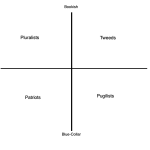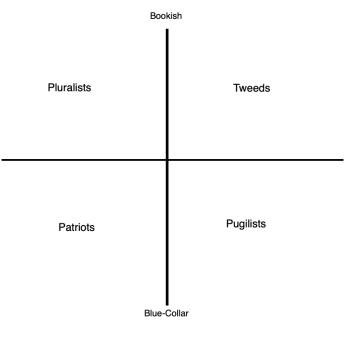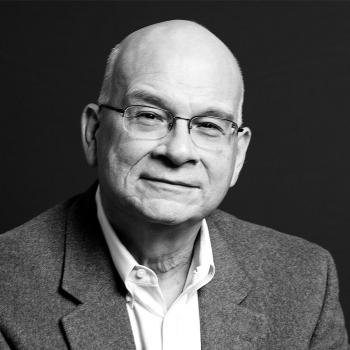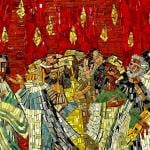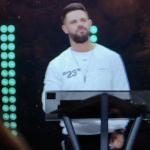 Between a long list of writing commitments and keeping up with an active toddler, it’s been a very, very busy year. But it’s also been a productive one: at this point, it’s looking like I’ll clock in at somewhere around 125 books for the year. This year I finally succumbed to the audiobook trend (a lot of time commuting and pushing a stroller will do that to you), and I’ve been glad to get through some denser historical volumes I might not have read otherwise.
Between a long list of writing commitments and keeping up with an active toddler, it’s been a very, very busy year. But it’s also been a productive one: at this point, it’s looking like I’ll clock in at somewhere around 125 books for the year. This year I finally succumbed to the audiobook trend (a lot of time commuting and pushing a stroller will do that to you), and I’ve been glad to get through some denser historical volumes I might not have read otherwise.
The good thing about having less time to read, though, is that I’ve become a bit more discerning about what I pick up. So even if the total page count might be a little lower this year, I’ve enjoyed the reading process so much more.
The Whole Mystery of Christ: Creation as Incarnation in Maximus Confessor (Jordan Daniel Wood)
In this breathtakingly sophisticated survey of the theology of St. Maximus the Confessor, Wood argues that this patristic thinker’s cosmological vision goes far farther than prior scholars have grasped: for Maximus, all of creation must ultimately be caught up into God’s transforming eschaton, with Jesus Christ as the archetype to which all things will finally be conformed. It is impossible to do justice to this book, which encompasses textual exegesis and systematic theology, in equal measure. All I can say is that it will change the way you see…everything. (I can’t resist adding that Maximus’s proposal is strongly congruent with Lutheran Christology—a parallel I am not the first to draw.) We need more work like this. It’s beautiful.
The Ancient City: A Study on the Religion, Laws, and Institutions of Greece and Rome (Numa Denis Fustel de Coulanges)
Most of us, shaped by films like Ben-Hur and Gladiator, have a sort of distant impression of what the classical Greco-Roman past “must have been like.” Fustel de Coulanges’s classic study throws that impression into doubt. As Fustel demonstrates through close readings of primary sources, the classical period was no proto-secularist regime, but one influenced by religion all the way to its core. The faith of classical Greece and Rome was no crude polytheism, but a coherent religious system built out of intricate networks of kinship and place and obligation—and understanding classical religion in this way helps make seemingly obscure references in the Iliad and Odyssey far clearer. This is a dense book, but well worth the effort.
Metamodernism: The Future of Theory (Jason Ānanda Josephson Storm)
Josephson Storm is one of my favorite scholars to read, and Metamodernism is him at his best. Rather than exploring the genealogies of religious ideas (as in his two prior books), here he provides a serious and brilliant effort to chart a course between classical essentialism and postmodern skepticism—one simultaneously acknowledging both the limits of knowledge and the objective reality of the phenomena described by social theory. Since reading it, I find myself frequently drawing on its insights in a whole variety of different contexts—and you will too. (For a wonderful set of intellectual explorations involving Josephson Storm’s proposal, see the Davenant Institute’s symposium on the book)
The Life of Moses (St. Gregory of Nyssa)
In this classic work, St. Gregory explores the typological significance of the Exodus account, analyzing it as the story of perennial movement toward God rather than as simply a historical narrative. In so doing, Gregory truly brings out the richness and sophistication of passages easily brushed aside by modern readers, opening up layers of the biblical text you’ve probably never before contemplated. This is patristic exegesis at its most exhilarating.
Fairy Tale (Stephen King)
First things first: this isn’t a horror story in disguise. Instead, it’s a traditional adventure fantasy that plays to all of King’s strengths—memorable characters, a distinct historical mood, coming-of-age motifs, and strange eldritch monstrosities. Plus, there’s a great dog. If a mashup of Narnia, The Call of the Wild, the Brothers Grimm, and H.P. Lovecraft sounds like your thing, you’ll love Fairy Tale. It’s the best thing King has written in years.
The End of History and the Last Man (Francis Fukuyama)
You may think you know what Fukuyama argues in this book. You probably don’t. Fukuyama’s analysis of liberal modernity is far from fawning; instead, here he provides a complex and multifaceted Hegelian treatment of how the modern world consensus came to be and why it’s likely to prove hard to dislodge. In particular, Fukuyama’s extensive treatment of the human “desire for recognition”—and its role in shoring up the liberal state—is a theme that postliberal critics of the status quo ought to engage far more seriously. Worth some serious reflection.
God’s Red Son: The Ghost Dance Religion and the Making of Modern America (Louis Warren)
You’d be forgiven for never having heard of the “Ghost Dance” religious tradition—a pan-Native movement in the late 1800s, centered on the mysterious apocalyptic prophet Wovoka. That’s because the Ghost Dance ended tragically, in the brutal massacre at Wounded Knee. Warren’s Bancroft Prize-winning study is the definitive treatment of this virtually unknown chapter in American history, a chapter that has a surprisingly hopeful coda. It’s as much a study of true resilience as it is of merciless violence and horror—and it pairs well with Jonathan Lear’s excellent book Radical Hope, which traces the course of a similar crisis among the Crow people.
The Dawn of Everything: A New History of Humanity (David Graeber & David Wengrow)
In this engagingly audacious “big book,” the late anarchist anthropologist David Graeber and his coauthor argue that human civilization—strictly speaking—didn’t need to take the form that it did. The emergence of agriculture didn’t create the absolute state, nor was the transition to agriculture an irreversible fall from grace. More possibilities of social organization are available. In the end, Graeber and Wengrow’s book is an extended argument for the possibility of social complexity that doesn’t require modern modes of bureaucratic governance; more specifically, it’s an argument that calls into question certain Western notions regarding the inevitability of modern centralization and authoritarian administrative governance (such as, for instance, those notions epitomized by Adrian Vermeule’s Law’s Abnegation). To be sure, Graeber is a somewhat controversial figure, and as I’m no expert in anthropology, I can’t speak to the quality of his evidence, but The Dawn of Everything is a stimulating read in any case.
Totality and Infinity (Emmanuel Lévinas)
Lévinas isn’t an easy read, but he is a valuable one. In Totality and Infinity, he delivers a decidedly ethical critique of Heidegger’s metaphysical vision, one that dares to suggest that the entire trajectory of Western metaphysics—including Heidegger himself—has forgotten its moral center. In response, Lévinas offers up a defense of alterity—true difference—grounded in the experience of encounter with the face of another, over against the metaphysical tradition’s homogenizing impulse. But that’s a lot of jargon; Totality and Infinity ended up on this list because its philosophizing culminates in one of the most moving treatments of parenthood I’ve ever read, one that truly grasps the unique relation of father and son. Worth the struggle.
Never (Ken Follett)
Follett is best known for his doorstopper-sized historical novels, like The Pillars of the Earth. Never is something quite different: a sugar rush of a geopolitical thriller, focused on the possibility of all-out war between the U.S. and China. Think Tom Clancy, but with a lot less jargon. Ranging from the claustrophobic confines of a terrorist mining camp to the global stakes of geopolitical situation rooms, Never is a sprawling page-turner that builds to one of the most nerve-shredding crescendos I’ve read in a long time.
Some honorable mentions: The Lonely Man of Faith (Rabbi Joseph Soloveitchik), Sea of Tranquility (Emily St. John Mandel)

